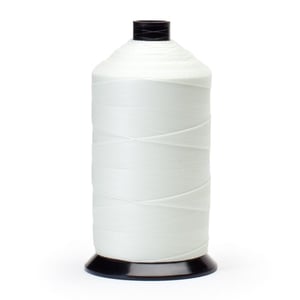When you’re sewing at high speeds, bonded thread prevents snags and breaks  that cause production interruptions and create flaws in your products. In many applications, bonded sewing thread is almost always a superior choice.
that cause production interruptions and create flaws in your products. In many applications, bonded sewing thread is almost always a superior choice.
Here’s a closer look at the characteristics of bonded thread and why it’s so important in industrial sewing.
What is Bonded Thread?
Bonded thread is typically a two, three, or four-ply construction coated with a polymer or resin that keeps the entire thread together during loop formation. The resin can also be applied to single-ply threads to keep them from untwisting during sewing.
This resin coating improves abrasion resistance, gives a uniform finish, and allows the thread to move smoothly with minimal friction during sewing. While bonded sewing threads come in a wide range of sizes, typically #46 through #660, we tend to focus on the strongest sizes for our industrial manufacturing customers. The main design of bonded thread applies to all sizes available.
Bonded thread is commonly used in industrial manufacturing operations where machine reliability and efficiencies are important, for example in the fields of filtration, geo-textiles, and industrial upholstery fabrication. Some large-scale users of bonded thread include manufacturers of automotive upholstery, leather goods, fall protection, and flat synthetic web-slings and tie-downs. Bonded threads are also used in sports equipment for excellent seam strength and can be used purely for decorative purposes, for example in cowboy boot designs.
How Bonded Thread is Different
Bonded thread is stiffer and smoother than non-bonded thread and although it’s not necessarily stronger, it’s far less likely to cause problems during sewing. If high-speed multi-directional sewing is part of your process, bonded industrial sewing thread can prevent the ply ends from opening up in the reverse direction, especially at an angle of 135 degrees, which keeps the hook from grabbing and cutting one of the plies.
Bonded threads also benefit from their coatings that improve long-term weather and environmental resistance. Their protective coatings improve the threads’ resistance to UV exposure, fading, and damage from many types of chemicals.
Another advantage of bonded thread is its mildew resistance. Since Service Thread’s proprietary coating solutions are non-aqueous, any residual moisture is driven off during the coating process. High-speed lubricants added to industrial sewing threads manufactured at Service Thread are also non-aqueous and will not mildew.
Speaking of lubricants, we’d like to remind you that lubricants are a crucial part of the process. No matter how well bonded a thread is, if it does not have an adequate level of lubricant applied, the needle and fabric may strip or shred the bond and cause skipped stitches and/or breaks.
When to Choose Bonded Thread
Are you using the right thread for the job? Opt for bonded thread when you have any of the following needs:
- Your product requires extremely smooth stitching and your machinery operates at high speeds.
- Your stitch pattern requires multi-directional sewing.
- Stitch seam integrity is a critical characteristic of your manufactured product quality.
- The sewing medium or material is very thick or abrasive, like synthetic webbing for flat slings, leather, or compound materials including composites.
- Your process uses a twin needle machine and the left needle needs a well-bonded thread to make good stitches.
See more about making the right thread choice in our related blog post, What is the Difference Between Bonded and Non-bonded Thread?
For more information about the characteristics of various threads and how to make the right choice for your application, please contact Service Thread.
As an American thread manufacturing company, we provide expert advice to other manufacturers and offer technical support and equipment sales and repairs for our industrial company clients. Service Thread offers both bonded and non-bonded thread for industrial sewing and can design a high-performance thread for most applications of scale.


